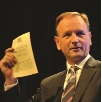News review – November 2018
Though some commentators are saying the traditional winter spike in demand for urgent care is now a year-round problem, governments across the UK continue to find additional pots of funding just as the winter months appear on the horizon. In September, the health departments in Scotland and England allocated £10m and £145m, respectively, to improve capacity. In October, the Welsh government handed critical care services a £5m boost to help relieve pressure in the winter months by strengthening and redesigning services. The funding is part of a previously announced £15m for critical care services in Wales.
The Department of Health and Social Care in England promised an extra £240m to council adult social care departments. It said the funding would help the NHS by reducing delayed transfers of care and increasing the number of care and reablement packages available in the community.
However, social care directors said the government must shift its focus from reducing delayed discharge to fully funding community services. They told an Association of Directors of Adult Social Services (ADASS) survey that the efforts to reduce delayed discharge had led to side effects that had adversely affected the long-term health and wellbeing of those being cared for. Council social services would overspend in 2018/19 and 89% of adult social care directors had limited or no confidence that their budget would be enough to fulfil their statutory duties by the end of 2019/20. Almost 80% of respondents told the ADASS that there had been an increase in the number of hospital admissions that could have been avoided if enough primary, community and social care capacity was available.
The Care Quality Commission said there should be a five-year funding settlement for social care, mirroring the funding for the NHS. The CQC said the five-year NHS funding is welcome, but risks being undermined without a similar long-term funding solution for social care. A report, The state of healthcare and adult social care in England 2017/18, said both sectors needed funding security for them to plan collectively for the long-term. It added that the quality of care has been maintained – and in some cases improved – since last year despite challenges of demand and funding.
The calls for greater funding certainty for social care were made against a backdrop of ever-increasing demand for healthcare, which is in turn affecting NHS operational performance. NHS England figures showed the proportion of A&E patients seen within the four-hour target period continued to fall in September in parallel with a sustained rise in activity. The monthly report said 88.9% of patients were seen within four hours – lower than the 89.7% recorded in September 2017. Though delayed transfers of care are falling, elective waiting lists are growing. At the end of August, 87.2% of patients had been waiting fewer than 18 weeks, but in August 2017 the figure was 89.4%.
In Wales, average A&E attendances fell in September, but the proportion of patients spending fewer than four hours increased slightly. Attendances dropped by 1.1% compared with August 2018 and were 0.9% lower than September 2017, according to the Welsh government. However, over the 12-month period to September 2018, A&E attendances were up 2.4%. A performance report said 80.3% of patients spent fewer than four hours in A&E in September 2018 – 0.3 percentage points more than August 2018, but 4.2 percentage points lower than September 2017. The number of patients spending more than 12 hours in A&E increased compared with August.
Away from operational performance, the NHS was urged to take advantage of potential efficiencies. The patent on the health service’s most expensive drug ended in October and NHS England told hospitals to be ready to find savings when cheaper alternatives become available. NHS England chief executive Simon Stevens said adalimumab (Humira), which costs the NHS £400m a year, is prescribed to more than 46,000 patients to treat conditions such as rheumatoid arthritis, inflammatory bowel disease and psoriasis. He said doctors should consider biosimilar alternatives after the patent expired on 16 October. NHS England guidance says most patients should be started on the best value medicine within three months of the launch of a biosimilar – these are expected to be available from December and could help save at least £150m a year by 2021.
Trusts have been urged to apply for funding to expand their use of LED lighting. NHS Improvement said the government has made £46m available for trusts through the NHS Energy Efficiency Fund. It said LED lighting would save money and provide patients, staff and visitors with a better experience.
 The Department of Health and Social Care estimated the financial cost of last year’s Wannacry cyber attack on the NHS in England was £92m. The figure includes £19m in lost output and IT costs of £0.5m during the attack and £72m in IT costs in the aftermath. The figures are included in an update on actions taken by the Department of Health and Social Care and its arm’s length bodies since February to boost cyber resilience in health and social care.
The Department of Health and Social Care estimated the financial cost of last year’s Wannacry cyber attack on the NHS in England was £92m. The figure includes £19m in lost output and IT costs of £0.5m during the attack and £72m in IT costs in the aftermath. The figures are included in an update on actions taken by the Department of Health and Social Care and its arm’s length bodies since February to boost cyber resilience in health and social care.Maidstone and Tunbridge Wells NHS Trust is no longer in financial special measures. NHS Improvement said the trust had increased its board-level stability, scrutiny and grip of its financial position. The oversight body said this had been a result of the appointment of a new chair and chief executive. The trust has reduced its underlying deficit by £15m and is delivering against its control total for 2018/19. It has also delivered year-on-year increases in its productivity and efficiency, NHS Improvement said.
From the HFMA
A newly announced financial framework and greater flexibilities will support the move to new models of care in Scotland, according to HFMA Scotland chair Derek Lindsay. In a blog for the HFMA website, he said finance professionals know health and social care faces a big transformation challenge over the next five years and beyond – and that they will play a key role in overcoming the challenge.
Crucially, NHS boards will be able to balance their books over three years rather than the current one year, and outstanding brokerage over the past five years will not be recovered. And there will be a rebalancing of spending between hospital and out-of-hospital services. While the framework spells out the challenge and shows where some of the savings will be found, multi-year budgets would further enhance flexibility, he adds.
In another blog, HFMA head of policy and research Emma Knowles reports on an HFMA US event in October, looking at intelligence, innovation and patient experience of care. It was an opportunity to look up from the immediate focus of finance staff, she says, and think about the patient experience and how finance staff, technology and other innovations can help improve it.

In the latest of his series of blogs, Bill Shields, Bermuda Hospitals Board chief financial officer, reflects on the board’s new clinical affiliation agreement with John Hopkins Medical in the US. The affiliate agreement is crucial to the health board and has given him an insight into how a non-NHS provider has tackled similar challenges to those in the UK.
www.hfma.org.uk/blogsThe month in quotes
‘Too often, social care finds itself moving resources to meet delayed transfers of care targets and this is having very real unintended consequences on emergency admissions and waits for people in need of community care.’
ADASS president Glen Garrod calls for local care teams to have a greater say in how winter funding is spent
‘The challenge for Parliament, national and local leaders and providers is to change the way services are funded, the way they work together and how and where people are cared for and supported.’
Greater health and social care integration is needed to improve care, says Ian Trenholm, Care Quality Commission chief executive

‘This decision reflects the determination and hard work of all staff at the trust over the past two years to deliver major improvements in their financial performance. While there remains more to do, everyone at the trust should be congratulated for their contribution to reach this landmark.’
NHS Improvement deputy chief executive and executive director of regulation Stephen Hay announces Maidstone and Tunbridge Wells NHS Trust is now out of financial special measures
 ‘Adalimumab is the NHS’s biggest spend on a single drug and, as the NHS develops the long-term plan, we want more clinicians to switch to use the best-value biologics, which will free up hundreds of millions of pounds to reinvest back into patient care.’
‘Adalimumab is the NHS’s biggest spend on a single drug and, as the NHS develops the long-term plan, we want more clinicians to switch to use the best-value biologics, which will free up hundreds of millions of pounds to reinvest back into patient care.’
NHS England chief executive Simon Stevens sees savings in biosimilar versions of costly drugs
Related content
We are excited to bring you a fun packed Eastern Branch Conference in 2025 over three days.
This event is for those that will benefit from an overview of costing in the NHS or those new to costing and will cover why we cost and the processes.
